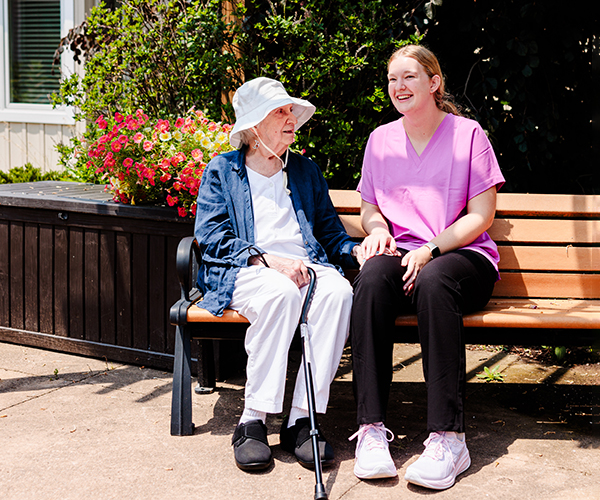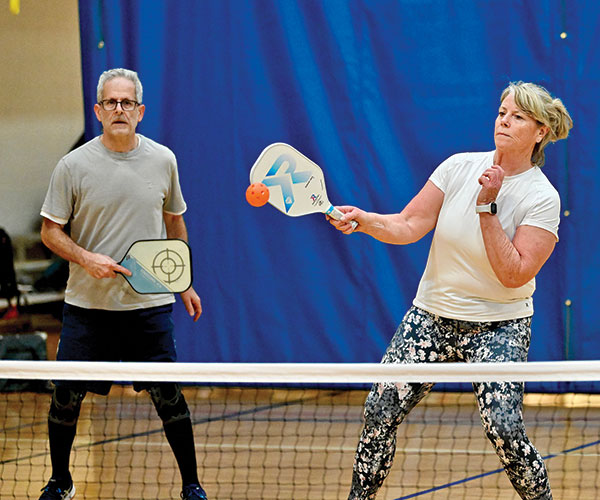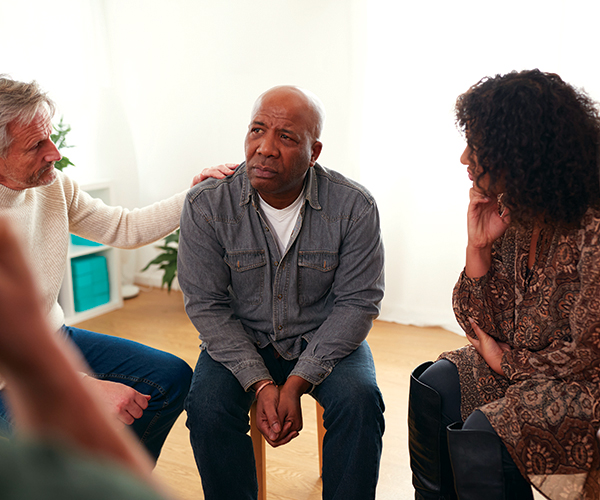When you see who she really is, my mother is adorable.
She's bright and brilliant, an artist whose work hangs on my walls. She's clever and funny, and she looks 15 years younger than her 83 years. My friends comment on her youthful spirit and resourcefulness. Articulate, talented and spirited, she can be a very interesting woman.
Not to mention incredibly courageous. Sometimes, when I look at her, I am reminded of the courage it took for her to beat cancer — twice — and I am overcome with admiration.
Lately, though, my sister and I have seen less of this amazing woman we love so dearly and more of an anxious, fearful, withdrawn woman who sometimes appears in her stead. It is much more difficult to communicate with and care for that woman.
Apparently, caring for my mother makes me a statistic. An estimated 22 million U.S. households currently provide care to a relative or friend 50 or older. Countless members of my generation are doing even more: caring for an aging parent, sometimes two, and also for their own children. Members of this "sandwich generation" are squeezed between more than just a parent and a child; they also have to consider their personal needs, those of a spouse and sometimes a career as well.
Time? Energy? Resources?
There are rarely enough.
Ironically, it's my mother's youthful spirit that makes this period in her life particularly difficult. She does not accept aging gently and, most days, she wants no part of it. She doesn't care to acknowledge that her faculties slip a tiny bit more every day. She doesn't always understand that sometimes her body won't allow her to do what her heart and mind want to do.
She's a wonderful person and I love her deeply.
She makes me proud, makes me laugh and makes me cry.
She writes poems for me, creates tiny pieces of art for me that I scatter around my office, makes me little candy balls that she calls "doodads."
Sometimes, she also makes me crazy.
I have to remind myself that her angry outbursts are against her own body's betrayal and not about me — I just happen to be in the line of fire. I know she's afraid of losing further control of her body and her mind, and I know her fears express themselves through irritability, withdrawal or critical stabs toward those she loves.
When she complains that she doesn't need my help on something (even though she asked for it the day before), I bite my tongue. When she can't remember something I said a few minutes ago, I take a deep breath and say it again. When she asks for the third or fourth time, I occasionally respond with more bite than I mean to. When this happens, a sad smile creeps onto her face and I remember that she is trying hard.
I am, too.
I'm 45 years old, trying to be a good daughter who takes good care of her mother. She's 83 and still trying to be the best mother she can be, which can mean resisting all my efforts because she doesn't want to be "a burden" or cut into my schedule too much. Together, we do the dance — a few steps forward, a few backward — hanging on to each other for dear life.
Some days, we trip over each other's feet and hurt each other's feelings; other times, we glide effortlessly across the floor, exchanging "I love you" at every turn.
But every day, we dance.
|||
My mother agreed to move to the Cleveland area from Houston last summer. I was thrilled. A month before her arrival, my sister purchased a duplex near our home and we renovated the bottom apartment. We primed, sanded and painted. We refinished floors, replaced windows and installed ceiling fans. Our mother's move would bring her closer so we'd have more time together and could assist with her medical concerns.
I was looking forward to sharing coffee breaks, friendly walks around the neighborhood and trips to the library. I'd talk to her about work issues and maybe even my personal life. She'd tell me all about her art classes and the organized trips she took with all her friends at the Senior Activities Center.
It would be great.
On the big day, I watched as movers hauled in crates of her art supplies, along with her finished canvases, her books on poetry and Eastern religion. I helped direct traffic, showing them where to put the very heavy massage chair that sends rollers up and down her back and neck.
My mother's belongings took only a couple of hours to unload. She and her tiny dog, Hannah, sat bewildered, considering their new adventure.
She'd left behind friends, a carefully constructed network of medical professionals and nearly a whole life's worth of experiences in one state. She brought more than her belongings with her: She also tugged along a healthy dose of trepidation, a little bit of excitement and a whole gaggle of questions.
After only a couple of weeks, I was overwhelmed. I hadn't given much thought to all the extra details involved in moving a senior across the country.
I sure wish she'd come with an owner's manual.
|||
Mother takes a seat in the waiting room while I schedule upcoming tests the doctor has requested. I hand the paperwork to the receptionist, who uses her pen to punch numbers on the phone's keypad. She holds up a finger to me and says, "I'll get the hospital and we'll just schedule this one right now."
"Great," I reply. There are three more tests to schedule after that one. I take out my calendar.
Finally, someone answers in the hospital's neurology department and the receptionist explains what test needs to be run. She asks questions and then answers some. Finally, she looks up at me.
"I've got the caregiver right here," she says into the phone.
She says it so casually, probably doesn't think twice about it because I'll bet she says it at least a dozen or so times a day.
But wait, something inside me screams. Wait a second. What did you just say? What did you call me?
The word assaults me and, for a moment, my blood runs cold.
"Caregiver."
Me? She's talking about me? No, wait, wait, I'm the daughter. Tell them her daughter is here.
Later, replaying this incident to my sister, I become alarmed all over again. I find it hard to stomach the word, although my rational mind realizes that's what I'm doing: giving care. I understand that being a daughter is a 24/7 thing, but somehow, "caregiver" brings with it so much more.
It seems so ... heavy.
|||
On the way to the doctor's office, Mother casually mentions that she got lost this morning on her way home from walking the dog.
"Lost?" I ask, trying not to sound as alarmed as I am.
"Well, yeah," she replies, waving her hand as if I'm being intentionally obtuse. "Lost."
"What happened?"
"I was walking the dog, and then I couldn't remember where my house was. I finally found somebody to ask, and he helped me figure out where I was."
It turns out she was standing on the corner of the very intersection she'd asked the man about. She was "lost" about 200 yards from her house.
"Oh, Mother," I say. "I'm so sorry. That must have been so scary."
"Well, it was," she admits and then offers a small chuckle, as if laughing about it will make it not what it was: a sign staring us in the face.
|||
After Mother's medical consultation, which ends about 10:30, I intend to return to my workday. On the way back, she asks if I can run a couple of errands for her. She's not feeling very well, she sighs, but there are some things that need taking care of today.
"OK, sure," I say, willing to take until noon to run the errands. "What is it that you need?"
She has a grocery list, a drugstore list and some library books to return. No problem.
At the drugstore, the pharmacist asks, "How is your mother doing?"
"She's just fine," I say, noting the sincerity in his voice. "Thanks for asking."
"Where's your mom today?" the grocery-store clerk asks, since we usually shop together. "Is she doing OK?"
"Just feeling a tiny bit under the weather. So I'm picking up a few things for her," I explain. "She'll be back next week."
"Oh, OK. I hope she feels better."
"Thanks."
On to the library, where I try to pick out light mysteries I think Mother would like. My favorite librarian notices my selections: "You shopping for your mom today?"
"Yep. I hope I do OK."
Back at Mother's, I've finished the morning's errands and I am ready to go home and start my workday. But the doctor's office has called and we need to schedule an appointment for a blood draw, and the neurologist wants a new MRI, which means an appointment at the hospital.
After scheduling these, when I'm on my way out the door, she asks if I can return something to the Senior Activities Center. It's the book from last month's book-club discussion, which Mother didn't attend because she wasn't feeling well. The Center needs it back right away, she insists.
"OK, I can do that," I hear myself saying. Inside, I can hear my brain reminding me, Patience, be patient, breathe.
At the Senior Center, I hand the book to the receptionist, who'd noticed that Mother didn't make it to the discussion. "How is your mom?" she asks. "Is she feeling better? We sure missed her."
"She's having a few neurological issues," I answer. "Nothing serious, I don't think. Just some tests."
"Well, tell her we said hello. Tell her we miss her and we look forward to seeing her again."
"I sure will. Thanks."
Back in my car, I note the time: maybe a couple of hours left in a workday if I get home right away and eat at my desk. Despite my best efforts, I can feel the sting of tears forming.
I'm just tired, I think to myself. Just tired.
And then, the torrent begins. I can't stop the tears, nor can I stop the petulant rant that accompanies them.
Yes, I'm tired. True. Yes, the day is gone and I haven't gotten any work done. What about me? Doesn't anybody want to know how I am? "How's your mom?" "How's your mom?" "How's your mom?" Well, how about this: How am I? Doesn't anybody care how I'm doing? Doesn't anyone understand how hard this is?
Almost immediately, I feel guilty, selfish and shallow, ungrateful for even thinking these thoughts. There are, of course, plenty of people who understand how hard this is, many of them who have it much harder than I do.
I just need a hug.
|||
Mother's phone has been busy for about an hour and a half. In between my work calls, I keep checking back.
Busy.
Maybe she's on the computer. But if she followed all the steps we wrote out for her to access her e-mail account — even considering how slowly she does things lately — she'd probably not be on the computer this long.
Busy.
She's probably forgotten to disconnect from the computer again. (My mother becoming a technical wizard has proved to be a blessing and a curse.)
I try again a few minutes later. Busy.
Finally, when I've finished my first round of the day's phone calls, I get into my car and drive over.
"Mother?" I call as I open the door.
"Well, come in," she sings as she walks to the door from the kitchen. "I was just trying to call you, but my phone is dead. It just doesn't work right."
"Your phone's been busy for an hour and a half," I say. "I've been trying to call since 10 o'clock."
"Well, it's not working," she says.
I walk over to the phone and pick it up. She's right. It's dead. I turn it off and then back on, same thing.
"See what I mean?" she says.
"Have you checked your other phone?" I ask.
"Oh, the one in the bedroom, you mean?"
"Yes, let's look at that one."
The bedroom phone is off the hook, half hung up, clearly hanging out of its cradle. I sigh, take a deep breath and say, "Your bedroom phone is off the hook."
"Oh. Well, that explains that. I must have not hung it up right after you called last night. Thanks for fixing it."
I have been anxious for almost two hours. How many times have we asked her to check both phones to ensure they are on the hook? I've lost work time checking this out; I've got so much to do. Why can't she be more contrite?
I take a deep breath and really look at her. I realize how relieved I am that she is OK.
She looks at me and sweetly says, "Oh, well, that explains that."
"Yes, I guess it does," I say and give her a hug.
|||
The dream has been a quick one, but scary, and I wake up in the proverbial cold sweat.
In it, I was old. I was dependent on my daughter to take care of me. I couldn't communicate my needs, because my mouth didn't say exactly what my brain was thinking. I didn't have much control over my memory and sometimes I repeated myself. Some days, I was cranky and mean.
In the dream, my daughter was ... me.
|||
One night, mother breaks down and tearfully expresses how hard it is to be so limited, to feel like she has nothing to give back to us.
I ask her for art lessons.
She will teach me to paint and to explore my creative boundaries. I want to learn everything that's in her head about art because I often marvel at how brilliant her ideas are, how lovely her work is, how I wish I could do it myself.
When she asks what I want to learn, I say, "Everything. Can we just hook a hose up from your head to mine, find the •art' section of your brain and just dump all that stuff into mine?"
She laughs and then gets that mischievous, little-kid look on her face. "Oh, goodie," she says. "I'll start thinking about what we can do."
|||
The doctor has suggested I monitor Mother's medications. Mother insists she doesn't need this kind of supervision. I suggest a compromise: Mother will pour out her pills for the week, distributing them into several of those plastic contraptions with daily compartments, and I will check to be sure they are correct. Everyone agrees to this solution.
Even though I am only checking to be sure there are no mistakes, it is overwhelming at first. I am alarmed at how many different medications she takes, how long this list is when it's all written out for my benefit. I am amazed at the system she has created with multicolored pillboxes coded with initials such as H.S., which means "hour of sleep" — which makes me smile, because my mother used to be a nurse.
I get over my anxiety and, for the first few weeks, the system works like a charm. There are a few mistakes here and there, an extra Warfarin pill in Tuesday's compartment or not enough Lamictal in Thursday. I correct these mistakes before any damage is done — exactly what the doctor intended.
But then comes a week when Mother isn't feeling well and doesn't want to go to the movie we'd planned.
"Are you OK?" I ask.
"Well, I think I might have taken too much Lamictal," she says.
I suck in a quick breath.
"But how could that happen? Your meds were right when I checked them."
"Don't fuss at me," she counters.
I take a deeper breath before I speak.
"I'm not fussing. I just don't understand how the pills got changed."
"I think I might have been in there," she says. "I probably changed it."
Stay calm. Breathe. Breathe.
"But the whole point is: When I check them, they're right," I explain. "You don't need to be in there for any reason."
"Well, I was," she says in the way that signals to me that this conversation is over.
As I drive home, I remind myself that I, too, will need to be cared for someday. Someday, I will know what this feels like from the other side.
|||
There's a note attached to the bulletin board in my home office. It's from my mother, carefully written in her own hand. I read it every day.
"Words cannot express how wonderful you are or how much I appreciate all that you have done and are doing to bring me health and energy. I love you and will as long as I live and ever after."
Our dance, Mother's and mine, covers a different part of the floor every day. Some days, it's so easy, almost effortless; others, it feels almost impossible to get off the chair to even make it onto the floor. Many times, we're both exhausted — she because her body can't do what it once could, and me because I've never asked mine to do what it's doing now.
But every day, no matter what — no matter how many times I remind myself to breathe, no matter how many times I soothe myself after something she didn't mean to say — the dance is always worth it.
Gamely, we hang onto each other, both vaguely aware this might be the last dance we get. We want to make it a good one.



